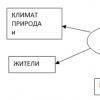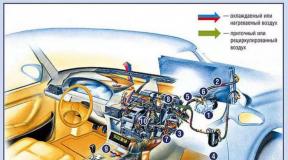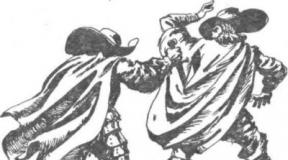Basic measures of war communism. War Communism briefly. Policy results
50. The policy of "war communism" essence, results.
"War communism" is the economic policy of the state in conditions of economic ruin and civil war, the mobilization of all forces and resources for the defense of the country.
The Civil War set before the Bolsheviks the task of creating a huge army, the maximum mobilization of all resources, and hence - the maximum centralization of power and the subordination of all spheres of the state's life.
As a result, the policy of "war communism", pursued by the Bolsheviks in 1918-1920, was built, on the one hand, on the experience of state regulation of economic relations during the First World War, because. there was ruin in the country; on the other hand, on utopian ideas about the possibility of a direct transition to market-free socialism, which ultimately led to the acceleration of the pace of socio-economic transformations in the country during the years of the Civil War.
The main elements of the policy of "war communism"
The policy of "war communism" included a set of measures that affected the economic and socio-political sphere. The main thing was: the nationalization of all means of production, the introduction of centralized management, equal distribution of products, forced labor and the political dictatorship of the Bolshevik Party.
In the field of economics: accelerated nationalization of large and medium-sized enterprises was prescribed. Accelerating the nationalization of all branches of industry. By the end of 1920, 80% of large and medium-sized enterprises were nationalized, employing 70% of employed workers. In subsequent years, nationalization was extended to small ones, which led to the elimination of private property in industry. The state monopoly of foreign trade was established.
From November 1920, the Supreme Council of National Economy decided to nationalize all industry, including small-scale industry.
In 1918, the transition from individual forms of farming to partnerships was proclaimed. Recognized a) state - the Soviet economy;
b) industrial communes;
c) partnerships for the joint cultivation of the land.
The surplus appropriation became a logical continuation of the food dictatorship. The state determined its needs for agricultural products and forced the peasantry to supply them without taking into account the possibilities of the countryside. For the confiscated products, the peasants were left receipts and money, which lost their value due to inflation. The established fixed prices for products were 40 times lower than the market ones. The village desperately resisted and therefore the surplus was implemented by violent methods with the help of food detachments.
The policy of "war communism" led to the destruction of commodity-money relations. The sale of food and industrial goods was limited, they were distributed by the state in the form of wages in kind. An equalizing system of wages among workers was introduced. This gave them the illusion of social equality. The failure of this policy was manifested in the formation of a "black market" and the flourishing of speculation.
In the social sphere the policy of "war communism" was based on the principle "Who does not work, he does not eat." Labor service was introduced for representatives of the former exploiting classes, and in 1920 - universal labor service. Forced mobilization of labor resources was carried out with the help of labor armies sent to restore transport, construction work, etc. The naturalization of wages led to the free provision of housing, utilities, transport, postal and telegraph services.
In the political sphere the undivided dictatorship of the RCP(b) was established. The Bolshevik Party ceased to be a purely political organization; its apparatus gradually merged with state structures. It determined the political, ideological, economic and cultural situation in the country, even the personal life of citizens.
The activities of other political parties that fought against the dictatorship of the Bolsheviks (the Kadets, Mensheviks, Socialist-Revolutionaries) were banned. Some prominent public figures emigrated, others were repressed. The activities of the Soviets acquired a formal character, since they only carried out the instructions of the Bolshevik party organs. Trade unions, placed under party and state control, lost their independence. The proclaimed freedom of speech and press was not respected. Almost all non-Bolshevik press organs were closed. The assassination attempts on Lenin and the assassination of Uritsky caused a decree on the "Red Terror".
In the spiritual realm- the establishment of Marxism as the dominant ideology, the formation of faith in the omnipotence of violence, the establishment of morality that justifies any action in the interests of the revolution.
The results of the policy of "war communism".
As a result of the policy of "war communism", socio-economic conditions were created for the victory of the Soviet Republic over the interventionists and the White Guards.
At the same time, the war and the policy of "war communism" had grave consequences for the country's economy. Violation of market relations caused the collapse of finance, the reduction of production in industry and agriculture.
The food requisition led to a reduction in sowing and gross harvest of major agricultural crops. In 1920-1921. famine broke out in the country. The unwillingness to endure the surplus led to the creation of insurgent centers. A rebellion broke out in Kronstadt, during which political slogans were put forward ("Power to the Soviets, not parties!", "Soviets without Bolsheviks!").
The acute political and economic crisis prompted the leaders of the party to reconsider "the whole point of view of socialism." After a broad discussion in late 1920 - early 1921, the gradual abolition of the policy of "war communism" began.
The policy of war communism of 1918-1921 is the internal policy of the Soviet state, which was carried out during the Civil War.
Background and reasons for the introduction of the policy of war communism
With the victory of the October Revolution, the new government began the most daring transformations in the country. However, the outbreak of the Civil War, as well as the extreme depletion of material resources, led to the fact that the government faced the problem of finding solutions to its salvation. The paths were extremely harsh and unpopular and were called the "policy of war communism."
Some elements of this system were borrowed by the Bolsheviks from the policy of the government of A. Kerensky. Requisitions also took place, and a ban on the private trade in bread was practically introduced, nevertheless, the state controlled its accounting and procurement at stubbornly low prices.
In the countryside, the seizure of landowners' lands was in full swing, which the peasants themselves divided among themselves, according to eaters. This process was complicated by the fact that embittered former peasants returned to the village, but in military overcoats and with weapons. Food deliveries to the cities have practically ceased. The peasant war began.
Characteristic features of war communism
Centralized management of the entire economy.
The practical completion of the nationalization of all industry.
Agricultural production has completely fallen into the state monopoly.
Minimizing private trade.
Restriction of commodity-money turnover.
Equalization in all areas, especially in the field of essential goods.
Closure of private banks and confiscation of deposits.
Nationalization of industry
The first nationalizations began under the Provisional Government. It was in June-July 1917 that the “capital flight” from Russia began. Among the first to leave the country were foreign entrepreneurs, followed by domestic industrialists.
The situation worsened with the coming to power of the Bolsheviks, but here a new question arose of how to deal with enterprises that were left without owners and managers.
The first-born of nationalization was the factory of the association of the Likinskaya manufactory of A. V. Smirnov. This process could no longer be stopped. Enterprises were nationalized almost daily, and by November 1918 there were already 9,542 enterprises in the hands of the Soviet state. By the end of the period of war communism, nationalization was generally completed. The Supreme Council of the National Economy became the head of this entire process.

Monopolization of foreign trade
The same policy was carried out in relation to foreign trade. It was taken under the control of the People's Commissariat of Trade and Industry and subsequently declared a state monopoly. In parallel, the merchant fleet was also nationalized.
Labor service
The slogan "he who does not work, he does not eat" was actively implemented. Labor service was introduced for all "non-working classes", and a little later, compulsory labor service extended to all citizens of the Land of Soviets. On January 29, 1920, this postulate was even legalized in the decree of the Council of People's Commissars "On the procedure for universal labor service."
Food dictatorship
The food problem has become a vital issue. The famine swept almost the entire country and forced the authorities to continue the grain monopoly introduced by the Provisional Government and the surplus appropriation introduced by the tsarist government.
Norms of per capita consumption for peasants were introduced, and they corresponded to the norms that existed under the Provisional Government. All the remaining grain passed into the hands of the state authorities at fixed prices. The task was very difficult, and for its implementation food detachments with special powers were created.
On the other hand, food rations were adopted and approved, which were divided into four categories, and measures were provided for accounting and distribution of food.

The results of the policy of war communism
The tough policy helped the Soviet government to reverse the overall situation in its favor and win on the fronts of the Civil War.
But in general, such a policy could not be effective in the long term. It helped the Bolsheviks to hold out, but destroyed industrial ties and aggravated relations between the government and the broad masses of the population. The economy not only did not rebuild, but began to fall apart even faster.
The negative manifestations of the policy of war communism led the Soviet government to start looking for new ways of developing the country. It was replaced by the New Economic Policy (NEP).
War communism is the policy of the Russian Communist Party of the Bolsheviks, which took power in Russia in October 1917, a set of emergency measures for governing the state during the war and the destruction of the entire economic system.The beginning of the policy of War Communism is considered to be May 13, 1918, when the decree "On the emergency powers of the People's Commissar for Food" was adopted. The end - the Tenth Congress of the RCP (b), held in Moscow from March 8 to March 16, 1921.
Tasks of war communism
Victory in the Civil War. To do this, the Bolsheviks needed to turn all of Russia into a single military camp under a common, that is, their own, leadership. The concept of a "single camp" meant the concentration in the hands of the Bolshevik government of all the resources of the country, and since the industry of Russia was destroyed by the World War and the subsequent years of confusion and anarchy, agricultural products, in other words, food, became the main resource, because no army can fight hungry will
Measures of the policy of War Communism
- Prodrazverstka
- Direct product exchange between city and countryside
- State distribution of products (card system)
- Naturalization of economic relations
- General labor service
- The equalizing principle of wages
- Deprivation of the power of the Soviets
- Prodrazverstka is a forced redemption from the peasants of all the surplus crops grown by them. Since there was nothing to buy back, the surplus was simply taken away, and everything was taken away from the fact that the concept of “surplus” did not have an exact definition.
- Direct product exchange - natural, without the use of money, the exchange of products for manufactured goods
- Card system - a person could receive a certain, no more no less, amount of food only from the state
- Naturalization of economic relations - prohibition of trade. On July 22, 1918, the Decree of the Council of People's Commissars "On Speculation" was adopted, which prohibited any non-state trade. To provide the population with food and personal consumption items, the Council of People's Commissars decreed the creation of a state supply network.
- General labor service - non-economic coercion to work
- The councils of deputies, who tried to soften the policy of the government, were dispersed.
Consequences of war communism

One of the results of the policy of war communism was the famine in the Volga region, which broke out in 1912-1922 and claimed more than 5 million lives.
When the October Revolution ended, the Bolsheviks began to implement their most daring ideas. The civil war and the depletion of strategic resources forced the new government to take emergency measures aimed at ensuring its continued existence. The complex of these measures was called "war communism".
In the autumn of 1917, the Bolsheviks seized power in Petrograd and destroyed all the highest organs of government of the old government. The Bolsheviks were guided by ideas that were little consistent with the usual way of life in Russia.
- Causes of War Communism
- Features of war communism
- Politics of war communism
- The results of war communism
Causes of War Communism
What are the prerequisites and reasons for the emergence of war communism in Russia? Since the Bolsheviks understood that they would not be able to defeat those who opposed the Soviet regime, they decided to force all the regions subject to them to quickly and accurately execute their decrees, to centralize their power in the new system, to put everything on record and control.

In September 1918, the Central Executive Committee declared martial law in the country. Due to the difficult economic situation of the country, the authorities decided to introduce a new policy of war communism under the command of Lenin. The new policy was aimed at supporting and reconfiguring the state's economy.
The main force of resistance, which expressed their dissatisfaction with the actions of the Bolsheviks, was the working and peasant classes, so the new economic system decided to provide these classes with the right to work, but on the condition that they would be clearly dependent on the state.
What is the essence of the policy of war communism? The essence was to prepare the country for a new, communist system, the orientation of which was taken by the new government.
Features of war communism
War communism, flourishing in Russia in 1917-1920, was an organization of society in which the rear was subordinate to the army.
Even before the Bolsheviks came to power, they were saying that the country's banking system and large private property were vicious and unjust. After the seizure of power, Lenin, in order to be able to maintain his power, requisitioned all the funds of banks and private traders.

At the legislative level policy of war communism in Russia began to exist from December 1917.
Several decrees of the Council of People's Commissars established the government's monopoly on strategically important areas of life. Among the main characteristic features of war communism are:
- The extreme degree of centralized management of the economy of the state.
- Total equalization, in which all segments of the population had the same amount of goods and benefits.
- Nationalization of all industry.
- Prohibition of private trade.
- State monopolization of agriculture.
- Militarization of labor and orientation towards the military industry.
Thus, the policy of war communism assumed, based on these principles, to create a new model of the state, in which there are no both rich and poor. All citizens of this new state should be equal and receive exactly the amount of benefits that they need for a normal existence.
Video about war communism in Russia:
Politics of war communism
The main goal of the policy of war communism is to completely destroy commodity-money relations and entrepreneurship. Most of the reforms carried out during this period of time were aimed precisely at achieving these goals.
First of all, the Bolsheviks became the owners of all the royal property, including money and jewelry. This was followed by the liquidation of private banks, money, gold, jewelry, large private deposits and other remnants of the former life, which also migrated to the state. In addition, the new government has established a norm for the issuance of money for depositors, not exceeding 500 rubles per month.

Among the measures of the policy of war communism is the nationalization of the country's industry. Initially, the state nationalized industrial enterprises that were threatened with ruin in order to save them, since during the revolution a huge number of owners of industries and factories were forced to flee the country. But over time, the new government began to nationalize the entire industry, even small ones.
The policy of war communism is characterized by the introduction of universal labor service in order to raise the economy. According to it, the entire population was obliged to work out 8-hour working days, and loafers were punished at the legislative level. When the Russian army was withdrawn from the First World War, several detachments of soldiers were transformed into labor detachments.
In addition, the new government introduced the so-called food dictatorship, according to which the process of distributing necessary goods and bread to the people was controlled by state bodies. To this end, the state has established norms for per capita consumption.
Thus, the policy of war communism was aimed at global transformations in all spheres of the country's life. The new government fulfilled the tasks set for itself:
- Eliminated private banks and deposits.
- Nationalized industry.
- Introduced a monopoly on foreign trade.
- Forced to work.
- Introduced food dictatorship and surplus appropriation.
The policy of war communism corresponds to the slogan "All power to the Soviets!".
Video about the politics of war communism:
The results of war communism
Despite the fact that the Bolsheviks carried out a number of reforms and transformations, the results of war communism were reduced to the usual policy of terror, which destroyed those who opposed the Bolsheviks. The main body that carried out economic planning and reforms at that time - the Council of the National Economy - ultimately could not solve its economic problems. Russia was in even greater chaos. The economy, instead of being rebuilt, fell apart even faster.
Subsequently, a new policy appeared in the country - the NEP, the purpose of which was to relieve social tension, strengthen the social base of Soviet power by an alliance of workers and peasants, prevent further aggravation of devastation, overcome the crisis, restore economies, and eliminate international isolation.
What do you know about war communism? Do you agree with the policy of this regime? Share your opinion in the comments.
"War Communism" is the policy of the Bolsheviks, which was carried out from 1918 to 1920 and led to the Civil War in the country, as well as to the sharp dissatisfaction of the population with the new government. As a result, Lenin was hastily forced to curtail this course and announce the beginning of a new policy (NEP). The term "War Communism" was introduced by Alexander Bogdanov. Sove began the policy of war communism in the spring of 1918. Subsequently, Lenin wrote that it was a forced measure. In fact, such a policy was a logical and normal course from the point of view of the Bolsheviks, arising from the goals of the Bolsheviks. And the civil war, the birth of war communism, only contributed to the further development of this idea.
The reasons for the introduction of war communism are as follows:
- Creation of the state according to communist ideals. The Bolsheviks sincerely believed that they could create a non-market society with a complete lack of money. For this, it seemed to them, terror was needed, and it could only be achieved by creating special conditions in the country.
- Complete subjugation of the country. For the complete concentration of power in their hands, the Bolsheviks needed complete control over all state bodies, as well as over state resources. This could only be done by terror.
The question of "war communism" is important in a historical sense for understanding what happened in the country, as well as for the correct causal relationship of events. This is what we will deal with in this article.
What is "war communism" and what are its features?
War Communism is a policy pursued by the Bolsheviks from 1918 to 1920. In fact, it ended in the first third of 1921, or rather, at that moment it was finally curtailed, and the transition to the NEP was announced. This policy is characterized by the fight against private capital, as well as the establishment of total control over literally all spheres of people's lives, including the sphere of consumption.
History reference
The last words in this definition are very important to understand - the Bolsheviks took control of the process of consumption. For example, autocratic Russia controlled production, but let consumption take its course. The Bolsheviks went further ... In addition, war communism assumed:
- nationalization of private enterprise
- food dictatorship
- trade cancellation
- universal labor service.
It is very important to understand which events were the cause and which were the consequences. Soviet historians say that War Communism was necessary because there was an armed struggle between the Reds and the Whites, each of whom tried to seize power. But in fact, war communism was introduced first, and as a result of the introduction of this policy, a war began, including a war with its own population.
What is the essence of the policy of war communism?
The Bolsheviks, as soon as they seized power, seriously believed that they would be able to completely abolish money, and there would be a natural exchange of goods in the country along class lines. But the problem was that the situation in the country was very difficult, and here it was just necessary to keep power, and socialism, communism, Marxism, and so on, were relegated to the background. This was due to the fact that at the beginning of 1918 there was gigantic unemployment in the country, and inflation, which reached 200 thousand percent. The reason for this is simple - the Bolsheviks did not recognize private property and capital. As a result, they carried out nationalization and seized capital by terror. But instead they offered nothing! And here the reaction of Lenin is indicative, who blamed ... ordinary workers for all the troubles of the events of 1918-1919. According to him, people in the country are idlers, and they bear all the blame for the famine, and for the introduction of the policy of war communism, and for the red terror.

The main features of war communism in brief
- Introduction of surplus appropriation in agriculture. The essence of this phenomenon is very simple - practically everything that was produced by them was forcibly taken from the peasants. The decree was signed on January 11, 1919.
- exchange between city and country. This is what the Bolsheviks wanted, and their "textbooks" on the construction of communism and socialism spoke about this. In practice, this has not been achieved. But they managed to worsen the situation and provoke the anger of the peasants, which resulted in uprisings.
- nationalization of industry. The Russian Communist Party naively believed that it was possible to build socialism in 1 year, to remove all private capital, by carrying out nationalization for this. They carried it out, but it did not give results. Moreover, in the future, the Bolsheviks were forced to carry out the NEP in the country, which in many respects had the features of denationalization.
- The ban on the lease of land, as well as the use of hired force for its cultivation. This is again one of the postulates of Lenin's "textbooks", but this led to the decline of agriculture and famine.
- Complete abolition of private trade. Moreover, this cancellation was done even when it was obvious that it was harmful. For example, when there was a clear shortage of bread in the cities and the peasants came and sold it, the Bolsheviks began to fight the peasants and apply penalties to them. The end result is hunger again.
- The introduction of labor service. Initially, they wanted to implement this idea for the bourgeois (rich), but they quickly realized that there were not enough people, and there was a lot of work. Then they decided to go further, and announced that everyone should work. All citizens from 16 to 50 years of age were required to work, including in labor armies.
- Distribution of natural forms of calculation, including for wages. The main reason for this step is the terrible inflation. What cost 10 rubles in the morning could cost 100 rubles in the evening, and 500 by the next morning.
- Privileges. The state provided free housing, public transport, did not charge for utilities and other payments.
War communism in industry

The main thing with which the Soviet government began was the nationalization of industry. Moreover, this process proceeded at an accelerated pace. So, by July 1918, 500 enterprises were nationalized in the RSFSR, by August 1918 - more than 3 thousand, by February 1919 - more than 4 thousand. As a rule, nothing was done to the heads and owners of enterprises - they took away all the property and everything. Here is something else interesting. All enterprises were subordinated to the military industry, that is, everything was done to defeat the enemy (whites). In this regard, the policy of nationalization can be understood as the enterprises that the Bolsheviks needed for the war. But after all, among the nationalized factories and factories there were also purely civilian ones. But they were of little interest to the Bolsheviks. Such enterprises were confiscated and closed until better times.
War communism in industry is characterized by the following events:
- Decree "On the organization of supply". In fact, private trade and private supply were destroyed, but the problem was that private supply was not replaced by another. As a result, the supply collapsed completely. The resolution was signed by the Council of People's Commissars on November 21, 1918.
- The introduction of labor service. At first, the working off concerned only “bourgeois elements” (autumn 1918), and then all able-bodied citizens from 16 to 50 years old were involved in the work (decree of December 5, 1918). To give coherence to this process, work books were introduced in June 1919. They actually attached the worker to a specific place of work, with no options to change him. By the way, these are the books that are still in use today.
- Nationalization. By the beginning of 1919, all large and medium-sized private enterprises were nationalized in the RSFSR! In small business there was a share of private traders, but there were very few of them.
- militarization of labor. This process was introduced in November 1918 in railway transport, and in March 1919 in river and sea transport. This meant that work in these industries was equated with service in the armed forces. The laws here began to apply appropriate.
- Decision of the 9th Congress of the RCP b of 1920 (late March - early April) on the transfer of all workers and peasants to the position of mobilized soldiers (labor army).
But in general, the main task was industry and its subordination to the new government for the war with the whites. Has this been achieved? No matter how much Soviet historians assured us that they succeeded, in fact the industry in these years was destroyed and finally finished off. In part, this can be attributed to the war, but only in part. The whole trick is that the Bolsheviks staked on the city and industry, and they managed to win the Civil War only thanks to the peasantry, who, choosing between the Bolsheviks and Denikin (Kolchak), chose the Reds as the least evil.
All industry was subordinated to the central authority in the person of Glavkov. They concentrated on themselves 100% of the receipt of all industrial products, with the aim of its further distribution to the needs of the front.
The policy of war communism in agriculture
But the main events of those years took place in the village. And these events were very important and extremely deplorable for the country, since terror was launched to obtain bread and everything necessary to provide the city (industry).

Organization of the exchange of goods, mostly without money
On March 26, 1918, a special decree was adopted for the implementation of the PVK, which is known as "On the organization of commodity exchange." The trick is that, despite the adoption of the decree, there was no functioning and real exchange of goods between the city and the village. It did not exist not because the law was bad, but because this law was accompanied by an instruction that fundamentally contradicted the law and interfered with activity. It was an instruction from the People's Commissar for Food (NarkomProd).
At the initial stage of the formation of the USSR, it was customary for the Bolsheviks to accompany each law with instructions (by-laws). Very often these documents contradict each other. Largely because of this, there were so many bureaucratic problems in the early years of the Soviets.
History reference
What was in the instructions of the People's Commissariat for Food? It completely prohibited any sale of grain in the region, except for cases when the region handed over in full the amount of grain that was "recommended" by the Soviet authorities. Moreover, even in this case, an exchange was supposed, not a sale. Instead of agricultural products, the products of industry and cities were offered. Moreover, the system was arranged in such a way that most of this exchange was received by representatives of the authorities who were engaged in “extortion” in the countryside in favor of the state. This led to a logical reaction - the peasants (even small owners on the land) began to hide the bread, and were extremely reluctant to give it to the state.
Seeing that it was impossible to get bread in the countryside peacefully, the Bolsheviks created a special detachment - KomBedy. These "comrades" staged a real terror in the village, knocking out by force what they needed. Formally, this applied only to rich peasants, but the problem is that no one knew how to determine the rich from the not rich.
Emergency powers of the People's Commissariat for Food
The policy of war communism was gaining momentum. The next important step took place on May 13, 1918, when a decree was adopted that literally pushed the country into civil war. This decree of the All-Russian Central Executive Committee "On emergency powers." These powers were vested in the People's Commissar of Food. This decree was highly idiotic. did not hand over the grain as much as the state ordered him to. That is, the peasant is told that he needs to hand over, conditionally, 2 tons of wheat. The rich peasant does not hand over, because it is not profitable for him - he just hides. The poor does not hand over, because he does not have of this wheat. In the eyes of the Bolsheviks, both of these people are kulaks. This was in fact a declaration of war on the entire peasant population. According to the most conservative estimates, the Bolsheviks wrote about 60% of the country's population as "enemies"!
To better demonstrate the horror of those days, I want to quote Trotsky (one of the ideological inspirers of the revolution), which he voiced at the very beginning of the formation of Soviet power:
Our Party for the Civil War! The civil war needs bread. Long live the Civil War!
Trotsky L.D.
That is, Trotsky, as well as Lenin (at that time there were no disagreements between them), advocated war communism, terror and war. Why? Because the only way to keep power, writing off all their miscalculations and flaws in the war. By the way, this technique is still used by many.
Food orders and combos
At the next stage, Food Detachments (Food Detachments) and KomBeds (Committees of the Poor) were created. It was on their shoulders that the task of taking bread from the peasants fell. Moreover, a norm was established - a peasant could keep 192 kilograms of grain per person. The rest is the surplus that was required to be given to the state. These detachments performed their duties extremely reluctantly and undisciplined. Although at the same time they managed to collect a little more than 30 million poods of grain. On the one hand, the figure is large, but on the other hand, within Russia, it is extremely insignificant. Yes, and the Kombeds themselves often sold the confiscated bread and grain, bought the right from the peasants not to hand over the surplus, and so on. That is, already a couple of months after the creation of these “divisions”, the question arose of their liquidation, since they not only did not help, but interfered with the Soviet government and further aggravated the situation in the country. As a result, at the next congress of the CPSU b (in December 1918), the "Committees of the Poor" were liquidated.
The question arose - how to logically justify this step to people? After all, no later than a couple of weeks before that, Lenin proved to everyone that the Kombeds were urgently needed and without them it was impossible to govern the country. Kamenev came to the aid of the leader of the world proletariat. He said briefly - Combeds are no longer needed, since the need for them has disappeared.
Why did the Bolsheviks actually take this step? It is naive to believe that they felt sorry for the peasants who were tortured by the KomBedy. The answer is elsewhere. At this very time, the Civil War was turning its back on the Reds. There is a real threat of White's victory. In such a situation, it was necessary to seek help and support from the peasants. But for this it was necessary to earn their respect and, no matter what, but love. Therefore, the decision was made - the peasants need to get along and put up with.
Major Supply Problems and Complete Destruction of Private Trade
By the middle of 1918, it became clear that the main task of war communism had failed - the exchange of goods could not be established. Moreover, the situation was complicated, as famine began in many cities. Suffice it to say that most cities (including large cities) provided themselves with bread only by 10-15%. The rest of the townspeople were provided by "bagmen".
Sackers are independent peasants, including the poor, who independently came to the city, where they sold bread and grain. Most often in these transactions there was an exchange in kind.
History reference
It would seem that the Soviet government should carry “bagmen” in their arms, who save the city from starvation. But the Bolsheviks needed complete control (remember, I said at the beginning of the article that this control was established over everything, including consumption). As a result, the fight against bagmen began ...
Complete destruction of private trade
On November 21, 1918, a decree "On the organization of supply" was issued. The essence of this law was that now only the People's Commissariat of Food had the right to provide the population with any goods, including bread. That is, any private sales, including the activities of "bags", turned out to be illegal. Their goods were confiscated in favor of the state, and the merchants themselves were arrested. But in this desire to control everything, the Bolsheviks went very far. Yes, they completely destroyed private trade, leaving only the state, but the problem is that the state had nothing to offer the population! The supply of the city and the exchange of goods with the countryside was completely broken! And it is no coincidence that during the civil war there were "reds", there were "whites" and there were, few people know, "greens". The latter were representatives of the peasantry and defended its interests. The Greens did not see much difference between the Whites and the Reds, so they fought with everyone.
As a result, the easing of those measures that the Bolsheviks had been strengthening for two years began. And this was a forced measure, because people were tired of terror, in all its manifestations, and it was impossible to build a state on violence alone.
The results of the policy of war communism for the USSR
- A one-party system finally took shape in the country, and the Bolsheviks ended up with all power.
- A non-market economy has been created in the RSFSR, completely controlled by the state, and in which private capital has been completely removed.
- The Bolsheviks gained control over all the resources of the country. As a result, it was possible to establish power and win the war.
- Exacerbation of the contradictions between the workers and the peasantry.
- Pressure on the economy as the policies of the Bolsheviks led to social problems.

As a result, war communism, which we briefly talked about in this material, completely failed. Rather, this policy fulfilled its historical mission (the Bolsheviks gained a foothold in power thanks to terror), but it had to be hastily curtailed and transferred to the NEP, otherwise power could not be retained. So the country is tired of terror, which was the hallmark of the policy of war communism.




















